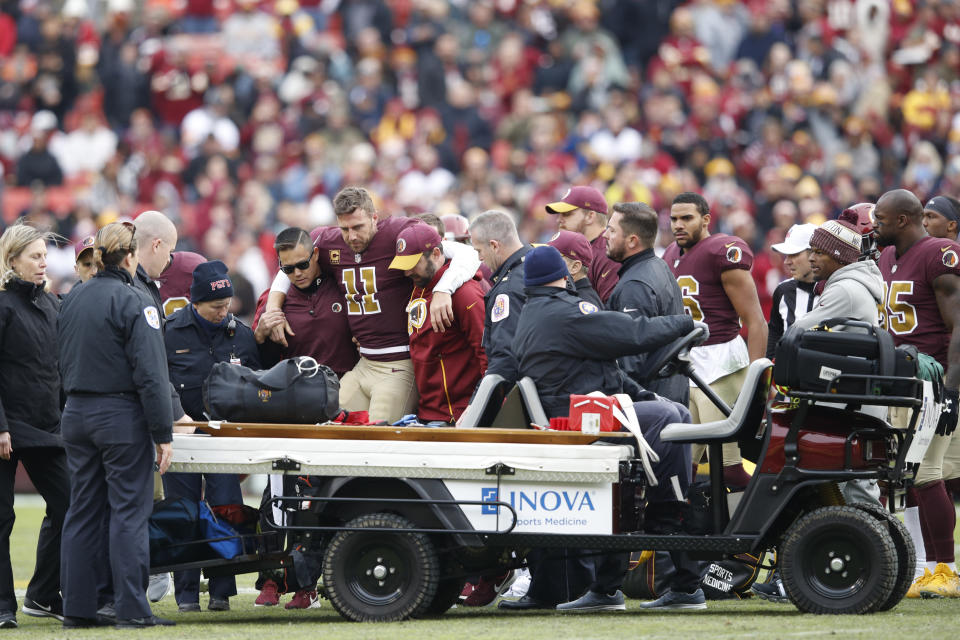Alex Smith's shattered leg is a huge reason why Le'Veon Bell made his controversial gamble
Even $14.5 million for one season wasn’t worth the risk of potentially losing as much as $45 million in guaranteed money in March.
For months, it was a one-sided argument against Le’Veon Bell giving up $14.5 million from the Pittsburgh Steelers.
Some argued that “accrued hits” was a myth and body clock was all that mattered in free agency. Others theorized lost money can never be regained at the end of a career. Deep in NFL circles, some even suggested that because the Steelers rarely cut their stars, Bell shouldn’t have focused so much on the guaranteed money Pittsburgh offered.
All the while, Bell had one counterpunch: What if?

On Sunday, Washington Redskins quarterback Alex Smith gruesomely illustrated that frightening hypothetical, suffering a broken leg that will go down as one of the league’s most brutal quarterback injuries in recent years. Taken in a broader context, it’s a ghastly demonstration of why many star players loathe playing on one-year deals. The sport is so violent and unpredictable, the course of a career can be dramatically altered on any one play.
This is why Bell sat out in 2018. Even $14.5 million for one season wasn’t worth the risk of potentially losing as much as $45 million in guaranteed money in March. And don’t kid yourself: Bell would have lost tens of millions in free agency if he suffered an injury similar to what happened to Smith against the Houston Texans.
This was Bell’s point. This was the business decision. This was Bell understanding the viciousness of the NFL and playing it safe rather than sorry. Pressed against the image of Smith’s leg snapping, that cautious approach looks less crazy than it did last week.
There’s also another factor that makes Smith’s injury more poignant when you consider Bell: The Redskins quarterback is protected by the kind of contract guarantees the Steelers running back is holding out to secure in 2019. Not only did Smith lock down $55 million in fully guaranteed money in his new contract, he also secured a grand total of $71 million in injury guarantees. If that broken leg costs Smith the rest of his career – a la Joe Theismann 33 years earlier (to the exact day, no less) – he’s walking away with his $71 million.
If a player is looking for motivation to hold out for long-term security, that’s one hell of a place to start. But in truth, Bell didn’t need the Smith injury to validate the “business decision” holdout. Not when so many other quality 2019 free agents have suffered significant injuries that will impact their free-agent market in a few months.
Guys like Seattle Seahawks safety Earl Thomas, who held out of the preseason for a trade or contract extension, then caved on the doorstep of the regular season and broke his leg in Week 4 – famously flipping off his sideline as he was carted off the field. Or franchise-tagged Detroit Lions defensive end Ziggy Ansah, who passed on holding out and has had a large portion of his contract season derailed by a shoulder injury.
Those are two guys who will enter free agency with significant clouds over their heads, potentially depressing some of the offers they receive in March. As will Philadelphia Eagles cornerback Ronald Darby and running back Jay Ajayi. Both are up for free agency in a few months and both have been lost for the season with torn ACLs. Just like Cincinnati Bengals tight end Tyler Eifert, whose free-agent market has essentially been wiped out by a broken ankle.

For all the talk about what Bell has left on the table, we rarely give serious credence to the reality that every NFL game is a significant risk. Especially for the heavy-load unicorn running backs – which is precisely what Bell would have represented for the Steelers this season. Not only would he have failed to get his deal from Pittsburgh, he would have faced having the team strip as much tread off his tires as it could before he left in free agency.
With that in mind – and knowing what has happened to Smith and others – Bell’s calculation makes sense. Is it still conservative? Yes. Is it hard to live inside the “what if?” world of an NFL player? Absolutely. Bell basically split the difference when it came to risk and reward. He guaranteed he wouldn’t get his $14.5 million single-season payday. But he also guaranteed he wouldn’t suffer some calamitous injury, too. Bell has already endured one serious knee injury in his career, suffered in 2015.
If he secures his massive deal in the next few months – something along the lines of $16 million to $17 million per season and $45 million in guarantees – he’ll have a strong argument that his conservative approach was worth it because, at the end of the day, players will say it’s the long-term guarantees (including injury guarantees) that matter most, not the short-term, single-season gratification of a franchise tag.
If you don’t believe that, let the wincing image of Alex Smith and his shattered leg be tempered with one thought: Smith has his long-term injury guarantees. He will get his money. His business decisions left him covered in the event of the worst-case scenario.
That’s exactly why Bell gambled away 2018.
More from Yahoo Sports:
• Browns deny report they want to interview Condoleezza Rice for head coaching job
• Updated college football bowl picture: Who could wind up where?
• Report: Le’Veon Bell seeking $17 million a year
• Week 11 fantasy rankings to maximize your lineup

